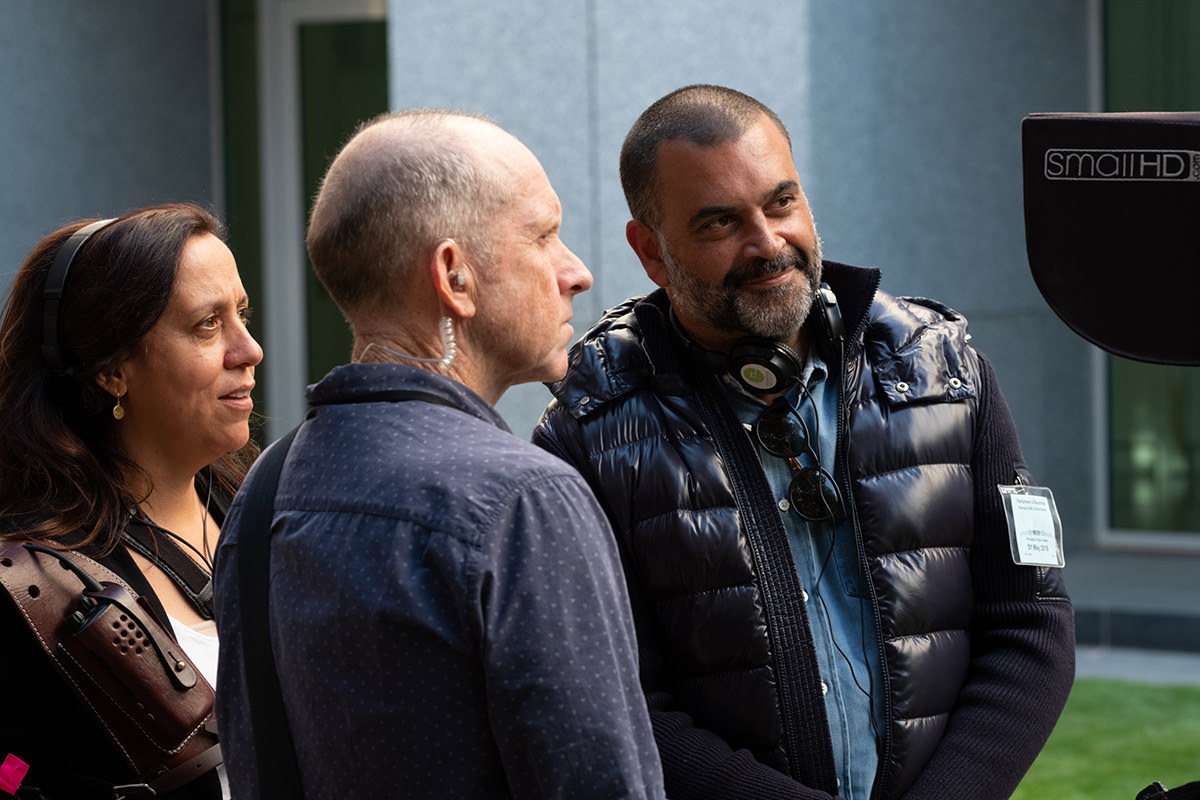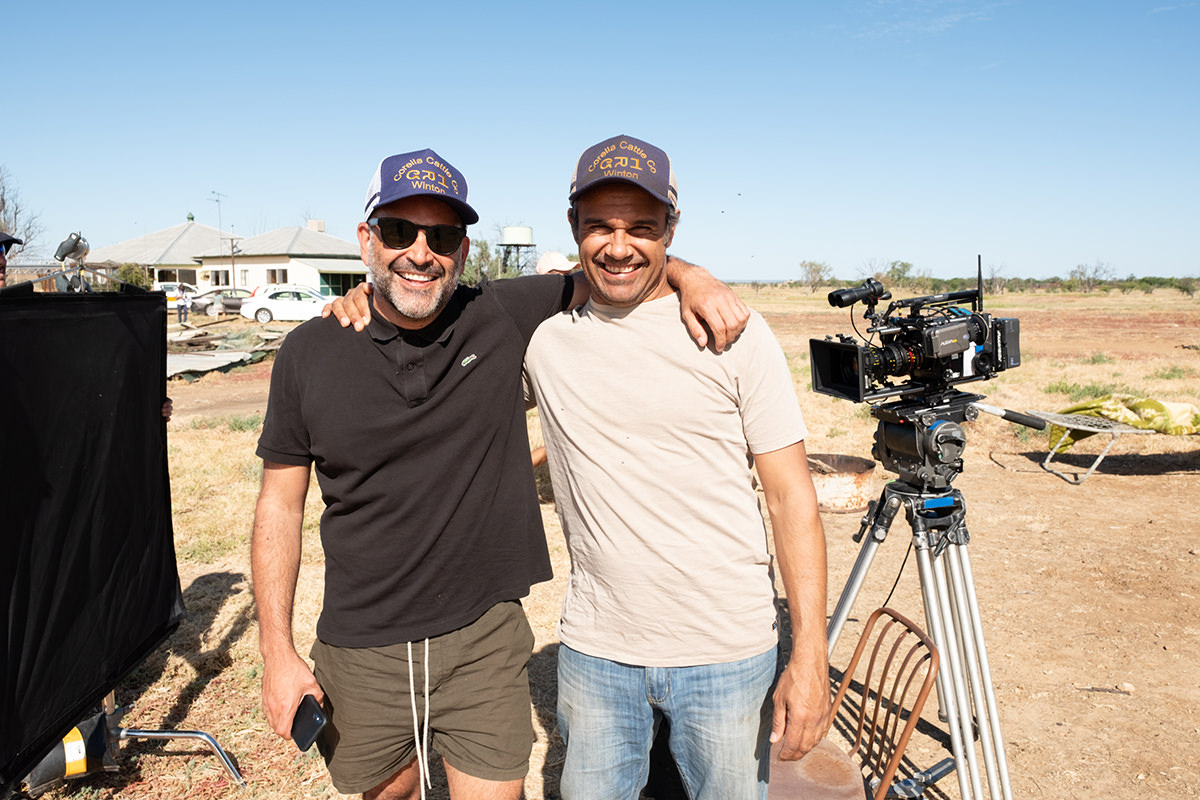Blackfella Films: Total Control and stories that resonate
From First Australians to Redfern Now and soon Total Control, producer Darren Dale on making TV that matters.

Rachel Perkins, John Martin and Darren Dale on the set of Total Control. Photo credit: John Platt.
With more than three hundred titles from across the globe, to say Toronto International Film Festival’s 2019 line-up was large would be an understatement.
And of those, only five were television series. One was Australian: Total Control starring screen royalty Deborah Mailman and Rachel Griffiths.
Now back on home soil and gearing up for the 13 October premiere on ABC, Blackfella Films producer Darren Dale says the feedback from audiences, distributor Keshet International and agents has been overwhelmingly positive.
“The response was really rapturous,” Dale says. “It couldn't have been a better foray into the world.”
Less than two years earlier, Total Control was still an idea, one that Dale and executive producer and co-star Rachel Griffiths spoke about developing.
It’s been a fast turnaround. “But there's something sort of exhilarating and thrilling about making something and knowing that a good idea has an energy of its own,” Dale says.
There were a number of things contributing to that energy. One was the premise, of an outsider being catapulted into the political arena, only to discover it was part of a cynical power play. Two, was hard work from the writers. And three, was knowing they had Griffiths and Mailman on board to star while they were still scripting.
“In this case it was wonderful knowing who those actors were early on… it really focuses and hones the work because you know [who] you're writing to,” he says.
It’s something he’s noticed is more appealing within the market too.
“Story of course is always king, but I think actors being central to that story is really important in the current financing world that we're living in.”
The selection for TIFF (a first for an Australian television series) was important for another reason.
While on one level it was testament to the quality of Total Control, it also fulfilled a larger mandate of Blackfella Films that has existed since before Dale joined the company.
Founded in 1992 by producer/director Rachel Perkins, Dale came on board in 2001 after a fateful short film workshop organised by the AFC (the predecessor to Screen Australia), where he and Perkins found they had a common goal.
“We wanted to make content that was by Indigenous people [and] about our people, but made for a broad audience,” he said.
“And I guess that was the meeting of minds really.”
The rest, as they say, is history.
His first projects at Blackfella Films were the short films Mimi by Warwick Thornton and Flat by Beck Cole – two filmmakers who had attended the same course.
He and Perkins would work with Cole again on Blackfella Films’ 2008 landmark SBS documentary series First Australians, which won a Logie, AFI, AWGIE, and the United Nations Media Peace Award, amongst others.
Four years later, the ABC ratings hit Redfern Now happened, breaking new ground and sweeping through the television awards categories once again.
“It was about showcasing Indigenous stories in primetime,” Dale says. “And the next layer of the onion was to give opportunities to writers and directors to give them broadcast credits.”
Similarly, the cast included emerging faces such as Aaron McGrath and Madeleine Madden whose careers have gone from strength to strength.
“I think just that difference of being in people's lounge rooms and being on primetime television really has an impact on people's careers,” Dale says.
Since those early days, as Blackfella Films has grown as a company, so too have their aims.
 Darren Dale and Aaron Pedersen on the set of Total Control. Photo credit: John Platt
Darren Dale and Aaron Pedersen on the set of Total Control. Photo credit: John Platt
“Over time that broadened out to stories that have something to comment on, or have some social impact, or talk about social cohesion or an inclusive society.”
It’s where you start to see projects like the acclaimed SBS drama Deep Water and documentary series First Contact and Filthy Rich and Homeless emerge – programs that ask viewers to think outside their own experience, or start a conversation.
The abovementioned projects also showcase the company’s equal commitment to both documentary and drama projects, instead of being defined by one or the other.
“It's absolutely been a business decision,” Dale says. “It's something that we've consciously sought to do.”
It’s why the team at Blackfella Films expanded to include producer Miranda Dear as Head of Drama in 2010, and writer/director Jacob Hickey as Head of Factual in 2013.
“Certainly factual stories, because of the budget level, because of the financing structures, I think that they create an element of sustainability for the business,” Dale says, “because the budget levels or the finance that you're seeking to attract to those projects just isn't as hard to raise as the drama.”
He says with drama being such an elevated space now, there’s a real pressure to make something that’s distinctive and different.
“Of course that requires higher budgets,” he says. “And if you want to attract bigger actors like Deb Mailman and Rachel Griffiths, if you're aspiring for a [certain] calibre of where you're trying to work and pitch - those budgets require resource. And finding partners for that is I think more challenging.”
Their approach is very different for both formats as well.
For Dale, “drama is all in the preparation.”
He says the work really starts before you get anywhere near a camera, refining those scripts so they’re in the best shape possible.
“Yes every shoot is very hard, but having the clear roadmap of what you're going to achieve when you start the shoot [is essential].”
But with factual there are just so many variables.
He says with the documentaries they’ve made in recent years – “immersive journey” stories such as First Contact, DNA Nation and Filthy Rich and Homeless – there’s definitely still a degree of planning.
“But then of course what makes documentary wonderful is the unexpected and the unexplained and how real people react to situations. That's the electrifying thrill of making that sort of factual work.”
The next challenge is then the edit, taking for example the 600 hours they had with Filthy Rich and Homeless and distilling that into a 3 x 1 hour series.
Dale says it’s that “trawling and editing” that makes documentary a longer journey than a drama series.
“But both really inform each other for me,” he says.
“The things you observe in real life experiences, and being really in touch with what's happening in your country, really informs drama as well, because ultimately it's all about humanity… and the range of emotions that we traverse. I find both equally rewarding.”
And after nearly two decades of working with Perkins and a variety of collaborators across Blackfella Films’ slate, perhaps Dale’s advice to emerging producers is unsurprising.
“Aspire to work with the best people you can,” he says.
“You don't have to have all the answers, but go and ask someone that you really respect or admire because they just might say yes to working with you.
“Our business is an ideas business, but the collaborators that you choose to work with are some of the most important decisions that you'll make.”
Total Control airs on the ABC and iview from Sunday 13 October.

What to read next
As Bunya Productions goes from strength to strength, its producers discuss remote locations, IP and tackling TV.
17 Jan 2018
Caris Bizzaca